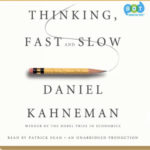The covid-19 pandemic is still spreading, I thought about Michael Lewis’ 2016 book, The Undoing Project, where he included the Asian disease problem: say, there is an unusual disease outbreak from Asia, and 600 Americans are expected to die from it. To prepare for the disease, two methods are being considered.
Group 1:
- A: 200 people will be saved if Mother A is employed.
- B: 1/3 will be saved and 2/3 will die
Overwhelming participants of this study chose A.
Group 2
- C: 400 people will die if C is picked
- D: 1/3 probability that no one dies and 2/3 probability that 600 will die
Overwhelming participants sided with D.
The conclusion is, people didn’t choose between things or options but chose between description of things or options. This study was done by two Israeli psychologists Daniel Kahneman and Amos Tversky, to prove how irrational we all are.
 When I looked the Undoing Project recently on Amazon, unfortunately, the Look inside ⇓ feature isn’t available, so I ended up listened to the entire book. Aside from it was an enjoyment, I’m surprised to find that, although it was mere a few years from my reading of it, (could not have been more than four years) that I’ve more take aways from it this time (or the same take aways but I couldn’t remember.)
When I looked the Undoing Project recently on Amazon, unfortunately, the Look inside ⇓ feature isn’t available, so I ended up listened to the entire book. Aside from it was an enjoyment, I’m surprised to find that, although it was mere a few years from my reading of it, (could not have been more than four years) that I’ve more take aways from it this time (or the same take aways but I couldn’t remember.)
The Undoing Project is about two Israeli psychologists Amos Tversky (1937-96), a cognitive and mathematical psychologist, and Daniel Kahneman (1934-), a psychologist and economist who had worked closely for fourteen years, from 1969 to 1983 on cognitive biases that becomes the foundation for behavioral economics, and their breakup in the end.
Their collaboration had shown, we’re NOT as rational as we think we’re. Our judgements, including the medical doctors’ are often erred.
Lewis talked about how he came to write this book. After his Moneyball was published in 2003, Richard Thaler (1945-) and Cass R. Sunstein (1954-), pointed out that Lewis had missed the point, from the perspective of behavioral economics. At that time Lewis had not heard of the Israeli pair. (For a period of time, Tversky’s son took Lewis’ class at Berkeley. And Lewis lives next door to Kahneman.)
The first half or third of the book, is an ode to Israel.
Economic is dry subject but not for Lewis whose story telling and writing are just wonderful.
Tversky was hired by Stanford in a heartbeat in 1978, setting a record for the school, because every other institutions in the US wanted him when he was on the market. Kahneman, however, had to make a do in Canada for eight years. Toward the end of their relationship, one was pretty meant to the other, like, ‘considering Harvard? That’s the school I diced.’ Tversky was getting lion share of the limelight for their work was the problem. The breakup, as Tversky’s wife said, was worse than a divorce. People are not so complicated, relationships between people are complicated, Tversky admitted.
Shortly before Tversky’s death Kahneman joined Princeton in 1993 and went on to win 2002 Nobel Memorial Prize in Economic Sciences; Thaler won the same in 2017.
 Because of Lewis’ book, I’m now at the beginning of Kanheman’s book: Thinking, Fast and Slow, with 8,017 comments as of today @ 4.5 star out of 5.
Because of Lewis’ book, I’m now at the beginning of Kanheman’s book: Thinking, Fast and Slow, with 8,017 comments as of today @ 4.5 star out of 5.
More on the covid-19
亚洲疾病问题 在路易斯 2016年的 《撤销项目》里出现过: 亚洲发生了一次罕见的疾病暴发,预计将有600名美国人死于该疾病.为了预防这种疾病,正在考虑两种方法 …
当然这是个假设题.来自两位以色列心理学家: 阿莫斯·特维尔斯基 Amos Tversky (1937-96; 一位认知和数学心理学家) 和丹尼尔·坎尼曼 Daniel Kahneman (1934-;一位心理学家和经济学家). 他们从1969年至1983年在认知偏见上紧密合作了十四年.从认知偏见 成为了现在行为经济学基础; 到最后他们分手 – 比离婚还痛苦. 分道扬镳的原因?一方忽视了另一方. 当特一表示想来美国时,整个东西海岸就展开了抢特炽热战–斯坦福大学用神的速度提交了雇佣合同,赢过哈佛.而坎只能在加拿大委屈八年;他在特去世前三年才去普林斯顿…特说过:人不复杂,人际关系复杂.
现在重新听一次 还是觉得收获满满–上次看一定是囫囵吞枣. 路易斯写这本书的起源是他2003年的出版 Moneyball 《钱球》(🎬布拉德·皮特主演的) 后, Richard Thaler 理查德·泰勒等写的书评指出, 路易斯完全错过了从行为经济学的角度重点.
路说”坎尼曼?特维尔斯基?! 听都没听说过.“后来他发现特的儿子是他的学生;坎是他隔壁邻居. 前半部或者前1/3 似是以色列颂.路讲故事的本领牛牛的+妙笔生花.
再后来,诺贝尔经济学奖, 坎赢2002年, 泰勒2017年.
再再后来, 我正在囫囵吞枣,慢慢啃坎尼曼 2011年的《思考,快和慢》. 截止到今天,共有8017条评论.
Be First to Comment